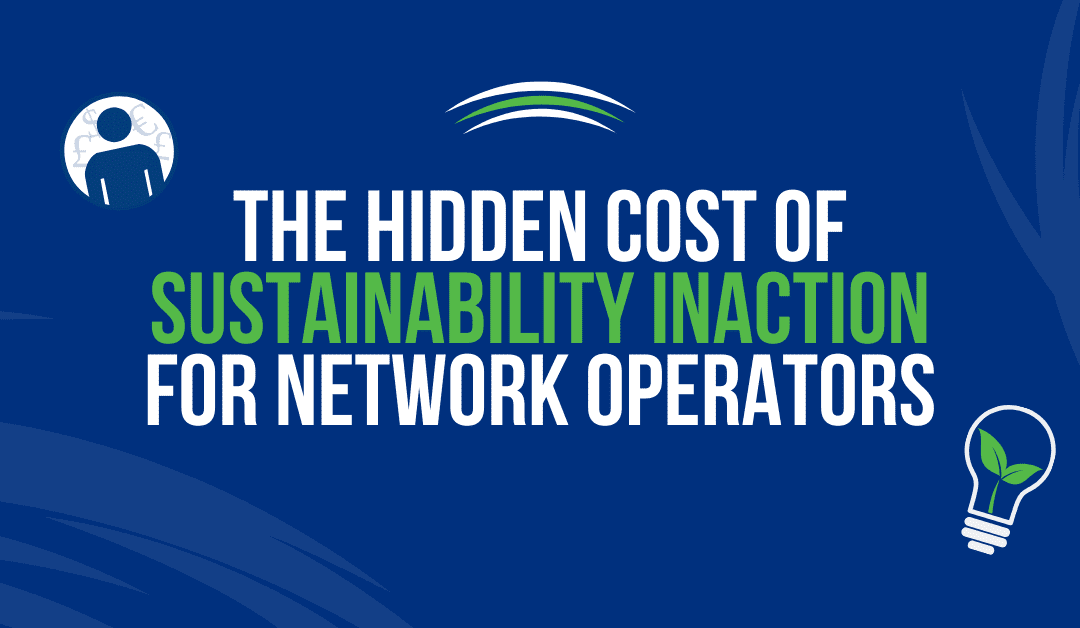Getting greener is no longer a “nice to have”, it’s a necessity.
In today’s rapidly evolving telecom industry, a network is no longer solely defined by its coverage, speed, or reliability.
Operators are coming up against louder calls to commit to sustainable practices, and inaction is now costing telecom companies more than they realise.
This blog explores the hidden costs of standing still in an industry driven by innovation and sustainability, to help networks avoid them. Let’s dive in.
The environmental impact of sustainability inaction
Like many other industries, telecoms is under increasing pressure to adopt sustainable practices. Let’s face it, failing to recycle or reuse network equipment significantly contributes to global waste and carbon emissions in several ways:
- Electronic Waste: Obsolete network equipment contributes to e-waste if we don’t recycle it. What’s more, hazardous materials in legacy equipment, like lead and mercury, can contaminate soil and water if improperly disposed of.
- Increased Carbon Emissions: Manufacturing new telecom equipment is energy-intensive, involving raw material extraction that emits large amounts of CO₂ and other greenhouse gases. And transportation doesn’t help either!
- Missed Energy Savings: Recycling and reusing equipment conserves resources like metals and plastics and requires less energy than producing new items, reducing overall carbon emissions. It also lessens the need for raw material extraction, cutting down environmental damage.
- Reduced Waste Through Lifecycle Extension: Reusing surplus equipment extends its life, delaying disposal and minimising waste, and recycling prevents old equipment from ending up in landfills.
Clearly, the responsibility on telecoms operators to switch to more sustainable processes is growing. And as concerns over climate change and environmental degradation intensify, stakeholders do indeed demand more from their service providers.
From where we’re standing, the telecom companies that fail to engage in green initiatives risk falling behind competitors who do. And those who act will be seen as leaders in environmental responsibility, potentially capturing a larger market share among eco-conscious consumers.
So, when the question becomes, who will be perceived as the green network in their region? …Which side of the green line will your network fall on?
Brand reputation at stake for those behind on sustainability
These days, a clean and environmentally sound reputation is more than just a moral obligation, it’s a business imperative. Consumers are increasingly inclined to choose brands that align with their values, including environmental stewardship.
Would a customer prefer a service provider that prioritizes its sustainability goals? The answer is almost always yes, with today’s consumers becoming more informed and conscientious about their purchases.
Did you know that 30% of consumers stopped purchasing certain brands and products because of sustainability-related concerns in 2023?
Click HERE to find out more about greener consumer buying habits and what your network can do to keep up.
As such, the perception of a telecom network now extends well beyond performance metrics; it’s the brand’s whole image that consumers are putting more trust in.
Opportunity costs to networks
Globally, brands are experiencing faster growth when they tackle ESG head on and tell consumers they’re doing it.
A recent paper by McKinsey & Company found that products making ESG-related claims on their packaging averaged 28 percent cumulative growth over the past five-year period, versus just 20 percent for products without.
Now just imagine how making bolder claims about how green your network is could impact your brand’s reputation. Thankfully for telecoms companies, there are simple and trackable ways to improve sustainability from the ground up.
How much better does “a successful network built on renewed equipment” sound than “a network built using freshly mined materials”?
Okay, so no-one’s quite saying that in their marketing messaging. But you get our point – if you can demonstrate how your network’s taking significant steps to improve its sustainable practices, especially in comparison to those who are doing nothing – you’re going to stand out in this increasingly green world.
The financial implications of resisting the green revolution
The financial implications of inaction extend beyond brand reputation and environmental impact too.
When you refuse to engage in the resale or repurposing of equipment, telecom operators miss out on significant cost savings and new revenue streams.
Resale markets for telecom equipment offer a valuable opportunity for companies to:
- Recover value from your assets
- Reduce waste
- Lower your environmental footprint
- Brand reputation
- Consumer revolt (the fashion industry has already felt this)
But the resale market isn’t just about selling surplus equipment; it’s about gaining access to innovative, cost-effective solutions that can enhance network performance and reduce costs too.
In other words, through resale platforms like ours, you’ll leverage high-quality, refurbished equipment at a fraction of the cost of new items.
…Which doesn’t just help you maintain a competitive edge, it also aligns with broader sustainability goals by reducing the need for new production and the associated environmental impacts. Now that’s what we call win win!
The regulatory costs: fines for telecoms operators
With governments around the world imposing stricter sustainability targets and regulations, networks face another potential cost of inaction: regulatory fines.
For networks operating in Europe, there’s the Corporate Sustainability Reporting Directive to comply with, and we expect other continents to follow suit with similar mandates soon.
Within the EU, individual member states will decide on their own repercussions for failure to comply, though France has already set a precedent with:
- Exclusion from public procurement contracts
- Monetary fines up to €18,750 for not publishing the report
- Up to €375,000 in fines for not appointing an accredited third-party auditor
- Or 5 years in prison for obstructing the audit
In other words, it pays to get greener and to tell the world all about it.
The cost of sustainability inaction is high – so what are you going to do about it?
The telecom industry is at a crossroads. Companies that fail to act on sustainability risk not only financial loss, but also the erosion of their brand’s value and trust.
However, there is a way forward. At Shields, we understand the complexities of the telecom landscape, and for 45 years, we’ve been at the forefront of telecoms renewal, resale and recycling, helping operators stay competitive while enhancing their brand reputation.
Now is the time to think beyond the operational aspects of your network and consider the broader implications for your brand and the environment.
If you’d like to discuss choosing Shields as your partner in renewing, reselling or recycling your legacy equipment, book a call below. Now let’s make sure your network is both successful and sustainable.


